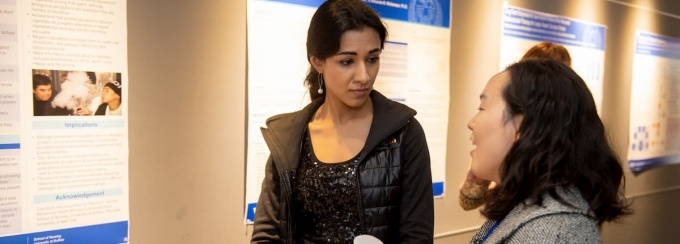Roswell Park/University at Buffalo Oncology Nurse Scientist Training Program
Post-MS to PhD Program

Nursing research encompasses a wide scope of scientific inquiry that provides a body of knowledge to advance nursing practice, shape health policy, and impact the health of people, families and communities both locally and globally.
This program prepares students to become global and national leaders, scientists and scholars who make significant contributions in theory generation and knowledge development. All doctoral classes are scheduled just two days per week in order to accommodate the working student. The program features a flexible learning environment with all required courses available online in a synchronous distance learning format.
Program Quick Facts
$470 per credit hour
Full or part-time
4-7 years
57
Fall
Synchronous online
Minimum 3.25
Fall start: December 16- April 1
*Estimated tuition is based on the resident rate and does not include fees.
Curriculum
| Courses | Credits | |
|---|---|---|
| NUS 715 | Synthesizing Multiple Determinants of Health Syndemics | 3 |
| NUS 711 | Proposal Design and Scientific Inquiry | 3 |
| NUS 681 | Nursing Informatics and Data | 3 |
| NUS 694 | Quantitative Methods in Health Care Research | 3 |
| NUS 700 | Advanced Theory Construction and Development | 3 |
| NUS 680 | Philosophical Inquiry and Nursing Knowledge | 3 |
| NUS 708 | Research Practicum | 2 |
| NUS 697 | Qualitative Methods in Health Care Research | 3 |
| NUS 695 | Advanced Statistical Techniques | 3 |
| *Responsible Conduct of Research | 0 | |
Foundation Credits: 14
*Required for all PhD students to enhance their knowledge of the responsibilities of the researcher.
| Courses | Credits | |
|---|---|---|
| NGC 602 | Data Science Applications in Healthcare | 3 |
| NUS 710 | Advanced Qualitative Methods-Phenomenology | 3 |
| NUS 705 | Designing/Testing Interventions | 3 |
| NUS 706 | Psycho-Social Measurement | 3 |
Research Credits: 12
*Students are required to take two of the above courses.
| Course | Credits |
|---|---|
| Electives | 12 |
Elective Credits: 12
Courses | Credits | |
|---|---|---|
| NUS 699 | Dissertation Guidance | 12 |
| NUS 702 | Transition Seminar (required each dissertation semester) | 1 |
Dissertation Credits: 13
Minimum Required Post-Master's Credits: 57
Successful completion of a written qualifying examination developed by the student’s dissertation committee and an oral defense of the proposed research for the dissertation are required of every PhD student before beginning their dissertation research.
The qualifying examination is generally attempted following the completion of all (or the majority) of coursework. Defense of the dissertation proposal provides an opportunity for the faculty, in addition to the student’s committee, to contribute to the scholarly development of the student’s work and promotion of science. The dissertation must represent the outcome of independent, original research mentored by the Chair and committee and is defended orally at the direction of the student’s dissertation Chair.



























